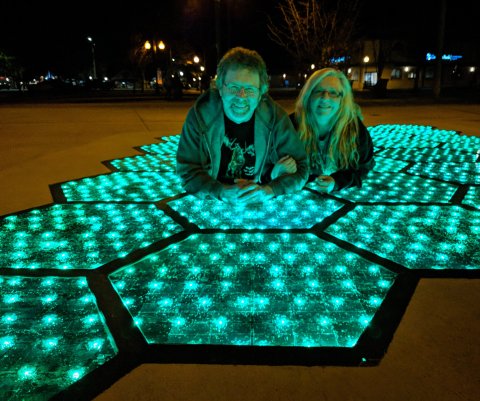
In celebration of the 50th anniversary of NASA astronauts landing on the moon, Newsweek is spotlighting pioneers in science and technology, highlighting their very own moonshots and how they hope to change the world.
Julie and Scott Brusaw are entrepreneurs in Idaho who have launched a company called Solar Roadways. They are working to develop new materials for streets and roads that can not only turn sunlight into electricity for the grid but also generate their own light and produce heat to melt ice and snow.
What is your moonshot?
Scott: Our goal is to cover all paved surfaces with solar panels that you can drive on.
What are your panels made of?
Scott: Think bullet-proof glass, think bomb resistant glass. You can tweak the formula and make it withstand anything an 18-wheeler can do to it.
How do they work?
Scott: We've got two pieces of half-inch thick tempered glass, and we laminate these two together with the circuit boards in between. The circuit boards have the LEDs and solar cells, the heating elements and the microprocessor. Solar cells put off DC energy, so if you installed the panels in your driveway or a parking lot, you would need to take that DC energy and convert it into AC energy. We have a micro inversor we use that takes that DC and turns it into 240 volts of AC. It goes right into a "load center," that's where your fuse box is, so it's feeding your house. If it's a parking lot, it's feeding your business. If it's a road, it can feed anything that's on the power line.
Julie: And we haven't begun offering them for sale. We aren't in full production yet.

Do you envision the panel installation being more of a thing where governments put them into highways or where homeowners put them into driveways?
Julie: All of the above, the public and the private sectors. I've got over 20,000 unanswered emails in my inbox, a mix of homeowners and business owners from all 50 states, virtually every country in the world. We've got interest from military bases, ski resorts, sports stadiums, hotels, resorts, airports, museums, churches, universities and the government.
What are the big challenges you've faced trying to make this a reality?
Julie: Funding is the main one. We were so fortunate to raise $2.2 million on our Indiegogo campaign, which enabled us to buy the building that we're currently in and buy the equipment and hire employees. But, that only goes so far.
Tell me a little bit about what phase you're onto now.
Scott: We have a manufacturer in Dayton, Ohio, under contract. They're buying equipment now so they can do 1,000 solar panels a day. We have another potential manufacturer in various areas of contract negotiation. The idea is to have a lot of manufacturers out there cranking these panels out as fast as we can because I think we've got a time clock on our planet.
In your wildest dreams, what do you see the world being like in 20 years if you're successful?
Scott: Covered in solar roadways.
Julie: And it seems like the world is moving towards the autonomous electric vehicle, and perhaps people won't own cars anymore. They will just call for an autonomous vehicle when they need to go somewhere, and they can get a small car if it's just them or a large car if they're taking a bunch of people. Those things will help the planet in so many ways. Our focus is how do we help the planet become sustainable, and that's what keeps us going every day.













